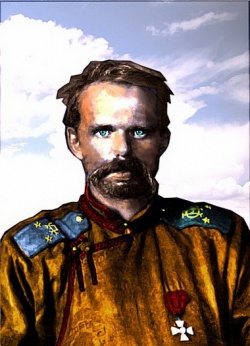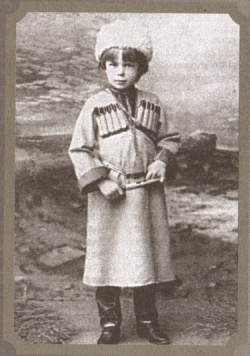Ungern-Sternberg
<poem
Some famous people get their own TV Tropes page for {{Wiki|being}} great scientists or politicians. Others for their {{Wiki|military}} skill or artistry. A few get it for simply {{Wiki|being}} so batshit insane that they can't be ignored.
Guess which category Baron Ungern-Sternberg falls under?
Going by the full name of FreiherrRoman Nikolai Maximilian von Ungern-Sternberg (usually shortened to Ungern-Sternberg or just Ungern), this blood-soaked Russian warlord seems like a character from a pulp {{Wiki|novel}}, but to his {{Wiki|victims}} he was all too {{Wiki|real}}. Born in 1886 to a family of {{Wiki|Baltic}} {{Wiki|German}} nobles (these families formed the {{Wiki|backbone}} of the Tsarist state), Ungern relished the ideals of absolute {{Wiki|monarchy}} and {{Wiki|feudalism}}. As {{Wiki|Russia}} was modernized in leaps and bounds, Ungern delved ever more deeply into right-wing {{Wiki|extremism}} and {{Wiki|ancient}} mysticism. A most unorthodox {{Wiki|Orthodox}} {{Wiki|Christian}}, he also absorbed (and horribly misinterpreted) several Buddhist ideals, and showed a general fascination with {{Wiki|East Asia}}.
Ungern wasn't a bully in school, but rather one of the kids that scared even the bullies. He did badly in the {{Wiki|military}} {{Wiki|academy}}, too spoiled and unstable to handle discipline. He jumped at the chance to fight the Japanese during the {{Wiki|Russo-Japanese War}}, but most of the conflict ended before he could get there. The seriousness of the situation did serve to drum at least a little bit of discipline into him, and Ungern, for all his {{Wiki|Russian}} {{Wiki|pride}}, admired the skill and courage of the {{Wiki|Imperial}} Japanese {{Wiki|Army}}.
At the end of the war, he went back {{Wiki|west}} where he was both horrified by the democratic reforms occurring in the {{Wiki|Russian}} government, and fascinated by new strains of mysticism (including a particularly rabid Anti-Semitism). He eventually joined the Transbaikal {{Wiki|Cossack}} Host. The hard-riding {{Wiki|Cossacks}} were rightly feared for their ferocity, and Ungern found himself right at home. As a man whose soul was fundamentally {{Wiki|medieval}}, he had never really fit in with the increasingly gentrified {{Wiki|Russian}} officer corps. Still, the {{Wiki|Cossack}} life could not offer the excitement Ungern craved. During this time, he got his first glimpse of Mongolia, and was enchanted by its antiquity and militant brand of Buddhism.
Ungern finally got his chance to fight during {{Wiki|World War One}}, where accounts describe him fearlessly leading charges into No Man's Land and conducting behind-the-lines guerilla operations against the Austrians. Though lacking much in the way of admirable traits, Ungern was at least brave, almost suicidally so. For {{Wiki|Russia}}, that war ended in the October {{Wiki|Revolution}}, which eventually turned into the horrific {{Wiki|Russian}} Civil War.
Given his {{Wiki|reactionary}} personality and {{Wiki|political}} views, it's no surprise that Ungern joined the Whites, who were mainly defined by their opposition to the {{Wiki|Bolshevik}} Reds. Most of the battles were fought in the icy abattoirs of {{Wiki|Siberia}}, atrocities piling up on both sides. Wolves grew fat on human flesh while bandit soldiers terrorized the countryside in armored trains. He was
eventually put in charge of {{Wiki|Dauria}}, a remote spot on the Manchurian-Russian border. He ruled absolutely and with horrific violence—Jews were singled out for special brutality. The fact that {{Wiki|Dauria}} doubled as an execution camp for Red prisoners served as another outlet
for Ungern's violence. Even among a bunch as {{Wiki|cruel}} as the White leaders (though the Reds were no better), Ungern achieved a reputation for legendary {{Wiki|sadism}}. Unlike the other Whites, he was an ascetic, and lived in the same conditions as his men. This was one of the reasons his soldiers stayed loyal to him in spite of his barbarity and obvious insanity. At this time, Ungern also took up an interest in fortune telling and {{Wiki|opium}} smoking.
Perhaps seeing that the Whites were doomed, he led his cavalry forces into Mongolia. There he planned to create a new {{Wiki|Mongol}} {{Wiki|Horde}}, and use it to conquer {{Wiki|Russia}} and usher in a {{Wiki|new age}} of {{Wiki|apocalyptic}} glory. At the time, Mongolia was a mess, reeling from the fallout of the {{Wiki|Russian Civil War}}, as well as an invasion from {{Wiki|China}}. The {{Wiki|Chinese}} had thrown out Mongolia's previous {{Wiki|theocratic}} ruler, {{Wiki|Bogd Khan}} (who was also considered a bodhisattva). The {{Wiki|Mongols}}
didn't like the {{Wiki|Chinese}} (or {{Wiki|Russians}}) very much. Ungern exploited the {{Wiki|Mongol}} tensions and beliefs to conquer the region with his half-starved {{Wiki|army}} of looters. He took the {{Wiki|capital}} city by setting fires in the hills surrounding it, making his force seem much bigger than it actually was. This bluff {{Wiki|crippled}} the already frightened {{Wiki|Chinese}} garnison. After this, he was declared a {{Wiki|khan}} with the approval of the {{Wiki|Bogd Khan}}, who was probably wondering what he'd gotten himself into at this point.
Ungern's tenure as warlord of Mongolia is notable mostly for its cruelty. He'd taken to dressing up in traditional {{Wiki|Mongol}} clothes and relying on soothsayers. Seeing Red spies and Jews behind every door, he began a horrific purge, all the while savoring his lunatic fantasies of a great Pan-Asian empire. This was an unlikely prospect for many reasons, not the least of which was Ungern's
complete failure to understand logistics. He never even had a clear idea as to the size of his {{Wiki|army}} (which was funded by loot). The {{Wiki|Soviets}}, seeing an opportunity to violently spread {{Wiki|communism}}, attacked Mongolia in 1921, achieving some success. In retaliation, Ungern attacked {{Wiki|Soviet}} territories until finally {{Wiki|being}} handed over to the Reds by his own officers. After a show trial, The Reds executed Ungern by firing squad on September 15, 1921.
And thus ends the story of Freiherr {{Wiki|Roman}} Nikolai Maximillian Ungern von Sternberg: the Bloody Baron, God of War, and Last Khan of Mongolia.
Note: Most of the information on this page was taken from The Bloody White Baron, a {{Wiki|history}} book about Ungern-Sternberg written by James Palmer. A chapter about him can be found in Setting the {{Wiki|East}} Ablaze by Peter Hopkirk, which describes him roughly the same way.
Both Hopkirk and Palmer draw heavily on {{Wiki|Ferdinand Ossendowski}}'s 1922 memoir Beast, Men and Gods. {{Wiki|Ossendowski}} was a {{Wiki|White Russian}} émigré who served for a time as {{Wiki|Ungern}}'s {{Wiki|political}} advisor.
</poem>

